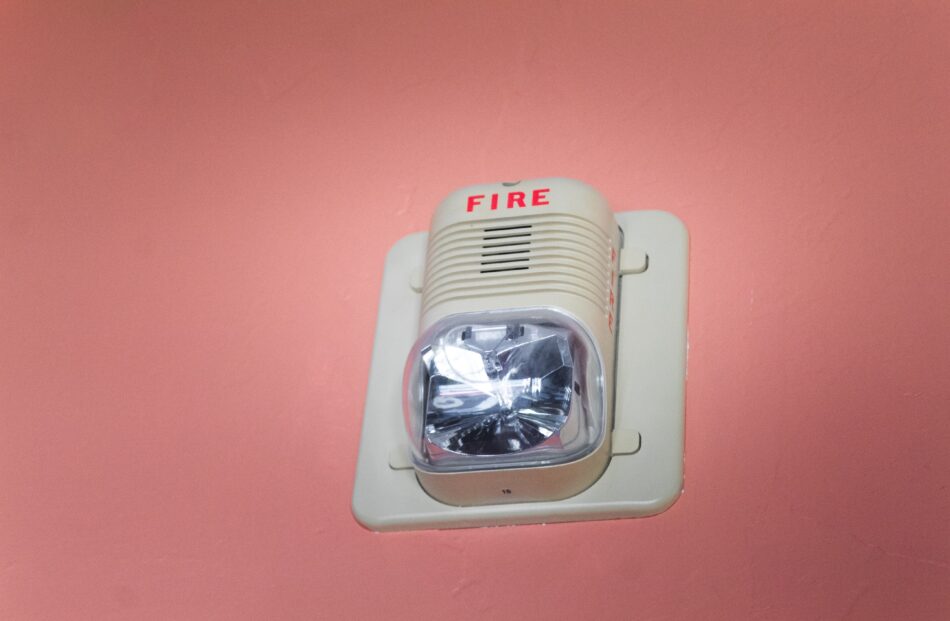How to Reduce Recycling Contamination
Contaminated recycling causes problems and means waste goes to landfill or is incinerated. Find out how to reduce recycling contamination in your business.

Fire alarms and smoke detectors are innovative, life-saving safety devices that alert us to the presence of fires in our homes, workplaces, and other buildings. Properly installed fire alarms have saved countless lives and it’s vital that every building has them. But what do you do with an old smoke detector or fire alarm?
Sometimes you simply need to change the batteries in a smoke alarm at home or work. However, fire alarms do eventually reach the end of their lives and need replacing. Discover how to dispose of and recycle an old smoke alarm safely and responsibly from your home or business with this guide.
Francis Robbins Upton patented the first electrical fire alarm system in 1890. At the time, his fire alarm design was quite unpopular, and few people used it. Over time though, many recognised the utility and safety that fire alarms offered properties and they grew in popularity.
Today, fire alarms are found in most buildings – especially those in larger towns and cities that require a rapid response from fire services.
Fire and smoke alarms are made up of several parts to help detect different stimuli, such as smoke or heat. Some of the common components that make up a fire alarm include:
Smoke detectors, heat, and fire alarms class as WEEE waste (Waste Electrical and Electronic Equipment). They must be disposed of properly by following the regulations surrounding WEEE products. Retailers must pay a fee that allows customers to return old alarms to local recycling centres for disposal.
Ideally you should remove the battery first and dispose of this alongside other battery waste. For domestic fire alarms and smoke alarms, you can dispose of a small number through normal household refuse. This should be a last resort only if your local recycling centre has no specific smoke or fire alarm arrangements in place.
For businesses and retail spaces with old smoke detectors or fire alarms, you must take them to a recycling centre for disposal. They cannot be disposed of through normal refuse. Arrange collection and removal by a licensed waste carrier such as Business Waste to dispose of your old fire alarms correctly.
Fire alarms and smoke detectors contain certain radioactive material, which means they need to be disposed of separately from general waste and recycling. The radioactive element is removed by a specialist contractor who sends it to a treatment facility that focuses on WEEE recycling.
Fire alarms also contain battery waste – which you can remove and dispose of separately. There are bits of metal waste in the circuit board, while the casing classes as plastic waste, though it will all be recycled together as WEEE waste.
Modern fire alarms and smoke detectors are constructed using a two-step process:
Most manufacturing of fire alarms is automated to ensure the health and safety of employees when dealing with radioactive material. Many quality tests and inspections are performed throughout the manufacturing process to ensure the fire alarm works as intended.
If an old fire alarm is marked for recycling, several components can be saved by specialists. Precious metals including gold and silver are carefully removed and recycled, as well as the plastic housing for the fire alarm. Circuit boards are also recycled, as they contain some precious metals and useful materials such as silicon.
This ensures as much as possible of your old smoke alarm is recycled. It prevents any waste ending up in landfill, where it could add to pollution.
If you’re a business that needs fire alarm disposal or recycling, you can drop small numbers of old alarms into recycling centres. The cost for recycling is passed onto the manufacturer of the alarms. Or you can arrange waste collection with Business Waste and our licensed waste carriers will transport your old fire alarms to an appropriate recycling centre for WEEE waste.
For domestic fire alarms, you can recycle them at your local recycling centre for free. Alternatively, you may be able to dispose of smoke alarms in your general household waste if your recycling centre lacks a scheme for fire alarm recycling. Check with your local authority for the best disposal method and costs.
Find out more about other rubbish streams.
Get a fast FREE quote for your waste
Contaminated recycling causes problems and means waste goes to landfill or is incinerated. Find out how to reduce recycling contamination in your business.
Many tourist hotspots look great in the photos but are sadly surrounded by rubbish and litter. Discover the 10 dirtiest hotspots in the world to avoid.